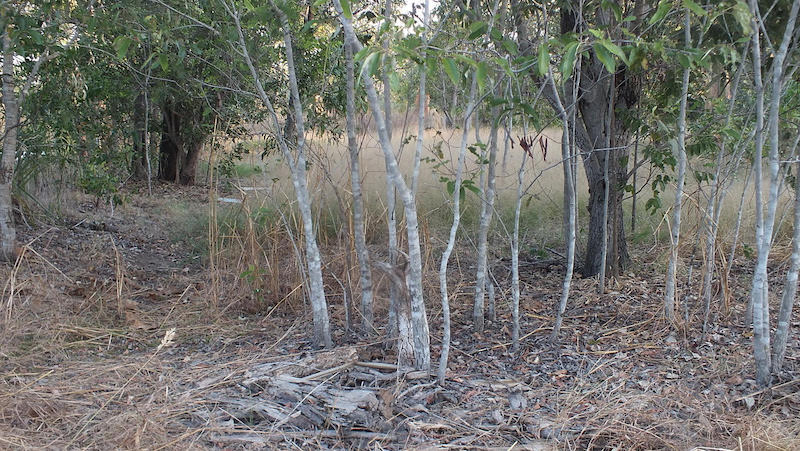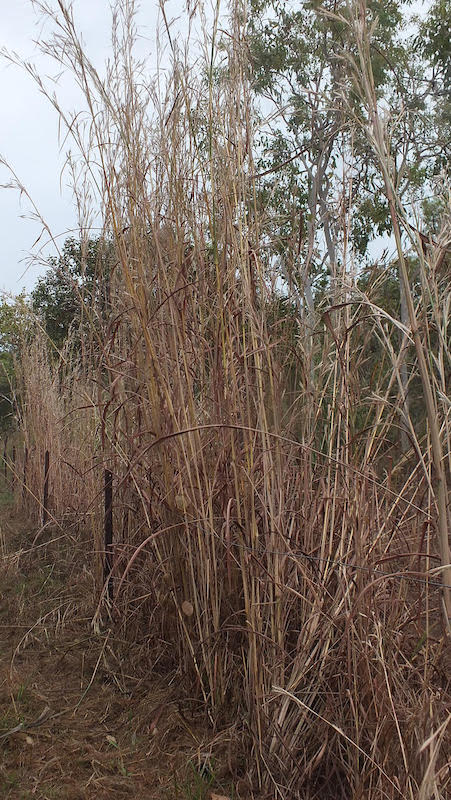Gamba grass (Andropogon gayanus) is a tall (4 metres high), multi-stemmed plant introduced to Australia in the 1930s as cattle fodder (Csurhes, 2005). The potential danger this grass posed was recognised early on, but despite assurances that it could be safely contained within paddocks heavily grazed by stock, gamba quickly escaped into surrounding savannah woodland (Petty, 2013) and elsewhere via “wind, water, animals and vehicles” (Beaumont, Keily & Kennedy, 2018). Now a weed of national significance gamba infests more than 1.5 million hectares of the Top End. The Top End is fast becoming a monoculture of gamba, and a ‘field of nightmares’ (Petty, 2013) for all concerned.
Gamba devastated the flora of woodland and even wetlands by crowding out trees and other plants, changing the nutrient status of the soil so that it better suits gamba than native vegetation, and fuelling wildfire so hot that even trees cannot survive - one study from Adelaide River 120 kms south of Darwin found 140 dead trees per hectare (Brooks, Setterfield & Douglas., 2010). A property near us lost 50-60% of it mature trees in one fire.
Gamba carries high-intensity crown fires more like those seen down south than the cool low fires once typical of the north. But unlike southern fires these Top End conflagrations can occur annually or ever more often (Kurucz, 2019). Every year our property southwest of Darwin Gamba won’t grow under these trees because of the saponins in their leaves is threatened at least once. Landholders have expressed both despair and fear at the amount of gamba grass infesting their land. We’re actually putting in a firegate at the east end of our property so that neighbours have an escape route should their property go up in flames. Tourists and locals alike have nearly died in gamba-fuelled fires.
Gamba won’t grow under these trees because of the saponins in their leaves is threatened at least once. Landholders have expressed both despair and fear at the amount of gamba grass infesting their land. We’re actually putting in a firegate at the east end of our property so that neighbours have an escape route should their property go up in flames. Tourists and locals alike have nearly died in gamba-fuelled fires.
Also, because of its high water uptake – three times as much as native grasses - gamba grass can reduce both groundwater and streamflow (Rossiter et al., 2003). Given a series of poor Wet seasons along with greater than average evaporation because of increasing maximum temperatures, communities and landholders risk running out of water.
Furthermore, it poses an opportunity for arsonists because of low population density in rural areas and therefore lack of surveillance.
For decades a glyphosate-based herbicide such as Roundup has been used to kill gamba grass. But many people don’t want to use glyphosate and for a variety of reasons. For example, they worry about the reported adverse health and environmental effects (van Bruggen et al., 2018). And protective gear is uncomfortable to wear in the Top End humidity.
 Gamba grass killed with glyphosateAnother concern is the potential for the weed to become resistant. Resistance is when a weed survives a normal herbicide treatment. The whole plant needs to be sprayed at least twice, and as we’ve witnessed on other properties, this does not always happen.
Gamba grass killed with glyphosateAnother concern is the potential for the weed to become resistant. Resistance is when a weed survives a normal herbicide treatment. The whole plant needs to be sprayed at least twice, and as we’ve witnessed on other properties, this does not always happen.
In 2012 during an interview of weed resistance Professor Stephen Powles of the University of WA stated that ‘something like glyphosate is as precious to Australian and global food production as penicillin is to human health’. But because of herbicide resistance, according to Professor Powles, we shouldn’t be sticking to it. According to Professor Jason Norsworthy, University of Arkansas, growers there have no choice but to handweed (Clark, Landline, March, 2013,
But killing gamba with glyphosate also leaves it standing and ready to feed fire into the tree canopy. (1. PHOTO OF DEAD GAMBA GRASS).
Some people just pull gamba grass up, but given the size of the weed this can be quite difficult particularly for small people like myself. Furthermore, it leaves a hole in the ground that should be filled and covered to prevent erosion.
So, for all the above reasons I began experimenting, some years ago, with different ways of getting rid of gamba that didn’t involve glyphosate or pulling the stuff out. But the most important thing was to remove tit from the tree canopy and so my first move was to push the plant over and stamp on the base so it stayed flat.
As a child I’d heard that vinegar killed weeds. But while it did away with small gamba plants it did not affect the large tussocks. That was until I flattened them, and crushed the lower stems. I then just poured vinegar on the base. The clumps, no matter their size, died, sometimes within hours (the biggest weeds took two days). (2. PHOTO OF GAMBA GRASS FLATTENED AND POISONED WITH VINEGAR).
Because the vinegar was only applied to the base there was no spray drift. Neither did I have to wear protective gear. In fact, the vinegar- – Coles Home Brand containing 4% acetic acid – is so safe a child could use it. Because vinegar can corrode rubber and metal, I apply it with a suitable chemical sprayer or a plastic watering can.
But vinegar is not the only safe way of controlling gamba. The weed does not grow under certain native trees for example, some acacias (eg A. auriculiformis, holosericea and mangium) and also red ash (Alphitonia excelsa). (PHOTO 3. BARE GROUND UNDER A. EXCELSA). The saponins, soap-like substances, in the leaves of these trees, are known to suppress the growth of other plants (Hoagland, Zablotowicz & Reddy, 1996). I also slash pure stands and lay down old corrugated iron which is removed a couple of months later. The gamba does not regrow.
Changing attitudes to gamba is difficult given the past ambivalence of governments (Neale, 2019) and support from the cattle industry. Yet, given the amount of glyphosate in use resistance must have already appeared somewhere. So, what happens when as occurred with other weeds, it stops working? Or when as has almost occurred on several occasions people die. There is no plan B.
REFERENCES
Beaumont, T., Keily, T. & Kennedy, S. (2018). Counting the cost: Economic impacts of gamba grass in the Northern Territory. https://gambagrassroots.org.au/counting-the-cost/.
Brooks, K. J., Setterfield, S. A. and Douglas, M. M. (2010). Exotic Grass Invasions: 520 Applying a Conceptual Framework to the Dynamics of Degradation and Restoration 521 in Australia's Tropical Savannas. Restoration Ecology 18: 188-197.
(Clark, Landline, March, 2013, https://www.abc.net.au/local/archives/landline/content/2013/s3722531.htm).
Csurhes, S. & Hannah-Jones, M. (2016). Gamba grass invasive plant risk assessment. Queensland Government (first published 2008, updated 2016). https://www.daf.qld.gov.au/__data/assets/pdf_file/0017/58004/IPA-Gamba-Grass-Risk-Assessment.pdf.
Hoagland R.E., Zablotowicz R.M., Reddy K.N. (1996) Studies of the Phytotoxicity of Saponins on Weed and Crop Plants. In: Waller G.R., Yamasaki K. (eds) Saponins Used in Food and Agriculture. Advances in Experimental Medicine and Biology, vol 405. Springer, Boston, MA
Kurucz, K. (2019). Fire frequency at gamba grass sites in Northern Australia. ENVT 4408 GIS, Automation and Programming, https://storymaps.arcgis.com/stories/75bd37f4a1ee46fbb84026d0463f0459.
Landcare (2012). Live export uncertainty complicates gamba management. Blogspot.com. http://landcarent.blogspot.com/2012/11/live-export-uncertainty-complicates.html
Luck, L., Bellairs, S.M., & Rossiter-Rachor, N.A. (2019). Residual herbicide treatments reduce Andropogon gayanus (Gamba Grass) recruitment for mine site restoration in northern Australia.
Neale , T.(2019): A Sea of Gamba: Making Environmental Harm Illegible in Northern Australia, Science as Culture, https://doi.org/10.1080/09505431.2018.1552933.
Petty A.M (2013). Field of nightmares: gamba grass in the Top End. The Conversation. http://theconversation.com/field-of-nightmares-gamba-grass-in-the-top-end-12178.
Powles S. B. (2008) Evolved glyphosate‐resistant weeds around the world: lessons to be learnt. Pest Management Science 64, 360–365.
Rossiter, N.A., Douglas, M.M., Setterfield, S.A. and Hutley, L.B. (2003). Testing the grass-fire cycle: Alien grass invasion in the tropical savannas of northern Australia. Diversity and Distributions, 9:169-176.
Van Bruggen A.H.C. et al. (2018) Environmental and health effects of the herbicide glyphosate. Sci Total Environ 616–617:255–268.
Related News
- Hand-washing in the bush: Traditional ‘soap’ plants provide alternatives to hand sanitisers Black wattle (Acacia auriculiformis) - ‘soap’ plants that have been long-used by Bininj A few months ago, a message appeared on Facebook. Posted by a family member living in...
- Wildlife Tourism the topic of Top End workshop What do tourists value when they visit Australia’s Top End? Are they into shock and awe? In other words do they care as much as the tourism industry about what Australi...
- Fat Birder brings pink stilettos to wildlife tourism World-famous birdwatcher, Bo Beolens, aka the Fat Birder, will call for more accessible nature reserves when he presents via podcast at a Darwin workshop that aims to improve wildl...
- Denise flies to Andes for Colombian Bird Festival By Denise Goodfellow When I first received the invitation to speak at the Bird Festival, I thought it was to be held in Columbia, USA. After all, who in their right mind wou...






